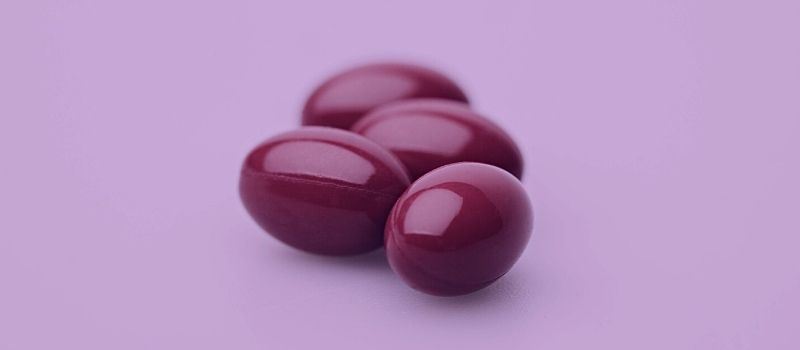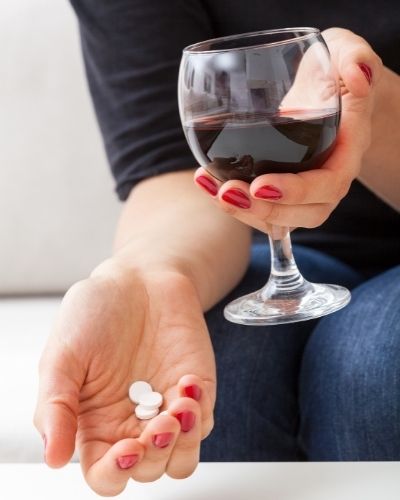Due to its strength and side effects, many are wondering about the lifestyle changes they would have to make when starting Accutane.
One of these is whether drinking alcohol while on Accutane is okay or should be avoided entirely.
Now, as a medication that can potentially interact with many foods, other medicines, and various substances, such as alcohol, drinking while on Accutane is not advised.
While this is the simplest answer, below, I will shed more light on this often-asked query and explore the potential risks and consequences associated with mixing Accutane and alcohol.
Drawing from medical research and expert advice, we’ll delve into why it’s generally recommended to avoid alcohol while undergoing Accutane and how prioritizing your health can lead to better treatment outcomes.

What is Accutane, and How Does it Work?
Accutane is the brand name for the medication known as isotretinoin, which is used to treat severe acne.
It is commonly prescribed to people whose acne has resisted previous treatments, such as benzoyl peroxide, adapalene, and antibiotics.
Accutane works by promoting apoptosis (programmed cell death) in sebocytes, the cells that produce skin oil.
This significantly decreases oil production, helping clear up acne since excess oil is essentially food for the acne-causing bacteria that live on the skin.
Therefore, once the gland’s activity is obstructed, it will produce less oil, which will cause the bacteria to become starved, thus minimizing proliferation and eventually minimizing acne.
Physiological and Psychological Side Effects of Accutane
The most common side effects of Accutane include:
- Dryness.
- Peeling.
- Itching.
- Redness.
- Increased sun sensitivity.
Other less common but possible side effects from Accutane include:
- Nosebleeds.
- Headaches.
- Joint pain.
- Hair loss.
It’s also been noted that some people experience mood swings and even depression while taking Accutane; however, a couple of studies that involved monitoring over 5,000 people who were taking the medication concluded that there’s no link between the drug and depression.
In fact, one of the studies actually proved the opposite.
Over 1,000 people taking Accutane for five months reported increased confidence as the severity of their acne subsided, which helped improve the overall quality of their lives and decrease depression caused by acne.
With all that said, it’s important to note that while isotretinoin-induced depression could affect some people with no prior history of the disorder, a great many have had pre-existing conditions that place them at risk, including substance abuse, bipolar disorder, or a family history of depression.
It’s also important to remember that just because you’re taking Accutane doesn’t mean that you will become depressed.
Most people who did become depressed while using isotretinoin found that their symptoms went away once they stopped using the drug.
However, for some people, depression and suicidal behavior persisted even after they stopped using the medication.
This suggests that while Accutane hasn’t been proven to be a direct cause of depression, the medication can affect everyone differently.
Therefore, if you notice signs of depression while on Accutane, it’s important to communicate your symptoms with your health provider and seek alternative solutions to your skin and mental health concerns.
RELATED: The Best Vitamins While on Accutane
Can You Drink Alcohol While on Accutane?

Drinking on Accutane is generally discouraged due to potential liver toxicity and increased risk of side effects, especially for heavy or binge drinkers.
Since both substances are processed through the liver, consuming Accutane and alcohol simultaneously can also lead to stomach problems, including nausea and vomiting.
Furthermore, drinking alcohol while using Accutane can increase your risk of experiencing side effects such as severe headaches and dry skin.
Additionally, fatigue is yet another potential side effect of mixing alcohol and Accutane, as both substances can cause an increase in the neurotransmitter gamma-aminobutyric acid (GABA), causing the body to slow down and become lethargic.
Moreover, alcohol and Accutane both affect the levels of dopamine in the brain.
Dopamine is a neurotransmitter that’s responsible for feelings of pleasure, so when you drink alcohol while taking Accutane, you may experience more intense effects from the alcohol.
The increase in dopamine production is also a factor that could potentially bring on the mental issues sometimes seen when the two substances are mixed, particularly addictive behavior and depression.
Lastly, Accutane is associated with elevations in serum triglycerides and cholesterol alongside decreases in HDL cholesterol (or good cholesterol.)
Therefore, if you’re already on a cholesterol-lowering regimen while drinking alcohol and taking Accutane, there is an increased risk of experiencing side effects from both substances.
How Much Should I Drink While Taking Accutane?

Because there are many possible side effects, it’s best to avoid alcohol consumption while taking Accutane.
However, if you choose to drink alcohol while on Accutane, the best way to do it is through guidance from your health provider.
It’s important to remember that everyone reacts differently to various medications, so there is no one-size-fits-all answer when it comes to how much you should drink when taking a particular medication.
Additionally, the dose of the medication may also play a role in the outcome.
For example, the potential side effects of drinking alcohol while taking low-dose Accutane might be lower and less significant than when taking a stronger dose.
Besides the dose, the longevity of the treatment, as well as the amount and potency of the type of alcohol you are consuming, matters, too.
For example, having a beer now and again while taking a low dose of Accutane for a couple of months might not be an issue; however, consuming strong drinks every day while taking a strong dose of Accutane for longer periods might potentially cause liver issues and even permanent damage.
Since the outcome may vary drastically from person to person, talking to your doctor, who is aware of your health history, is the best way to determine whether you should enjoy a drink while taking Accutane.
Therefore, don’t take the above as advice, as these are just examples of different ways the human body can react to mixing the two substances.
RELATED: Can You Get Botox While on Accutane?
How to Safely Drink on Accutane?
There isn’t a safe amount of alcohol while on Accutane, so it’s generally best to avoid any alcohol consumption during Accutane treatment.
As previously mentioned, both alcohol and Accutane can cause significant liver damage and can affect everyone differently.
So, while some people may not experience any health concerns while drinking during their Accutane treatment, others may potentially cause permanent liver damage and health issues.
Additionally, Accutane can potentially affect the mental health of some users, and alcohol can exacerbate these issues, which further proves that mixing the two substances isn’t a good idea.
Drinking on Accutane can also increase the risk of physical side effects and exacerbate headaches, dry skin, nosebleeds, drowsiness, and mood swings.
Therefore, it’s best to avoid alcohol consumption as much as you possibly can while taking Accutane or discuss alternative treatments with your health provider.
5 Accutane Alternatives to Treating Acne
Accutane is the most powerful medication for acne.
However, due to the severe side effects associated with it and the fact that most Accutane users will have to make drastic lifestyle changes to avoid them, many are looking for alternatives to help manage acne.
And while nothing on the market comes close to the potency and effectiveness of Accutane, acne can, in many cases, be managed without the need for this powerful drug.
Here are some effective Accutane alternatives to treating acne:
Salicylic Acid
Salicylic acid is a beta hydroxy acid (BHA) that works by dissolving the acne-causing gunk inside the pores, which makes it a highly effective acne treatment.
Unlike Accutane, which works systemically, salicylic acid acts directly on the skin’s surface and has anti-inflammatory and redness-reducing properties.
It’s also easier to get than Accutane, as it can be found in many over-the-counter products, including cleansers, toners, and serums and is suitable for all skin types.
This makes it an excellent Accutane alternative for people with mild to moderate acne who want to avoid the side effects associated with Accutane.
The only downside of salicylic acid is that it’s not as effective as Accutane for severe acne, but it can be used in combination with other treatments for better results.
Mandelic Acid
Mandelic acid, derived from the extract of bitter almonds, has gained attention as a potent and accessible alternative to Accutane in the battle against acne.
It operates by speeding up the rate of cell turnover and purging the skin of dead cells, preventing these from causing blockages that result in acne.
Additionally, like salicylic acid, mandelic acid is also gentle and suitable for all skin types thanks to its inflammation and redness-reducing properties.
Furthermore, mandelic acid can be a fantastic solution for post-inflammatory hyperpigmentation, the brown spots that remain on the skin after acne has healed.
Overall, this acid is a good option for those with mild to moderate acne, as well as those looking for a preventative treatment.
Benzoyl Peroxide
Benzoyl peroxide is a powerful acne-fighting ingredient that targets acne-causing bacteria and unclogs pores, providing an effective alternative to Accutane.
It works by infusing oxygen into the pores, which kills the type of bacteria that promotes acne because they cannot survive in an oxygen-rich environment.
Not only does benzoyl peroxide exterminate bacteria, but it also has a keratolytic effect, which means it can help remove dead skin cells and unclog pores, preventing accumulations that may cause additional breakouts.
With its dual action of killing bacteria and promoting skin exfoliation, benzoyl peroxide stands as an accessible, cost-efficient, and impactful alternative to Accutane in managing acne.
Sulfur
Sulfur, a naturally occurring mineral, is another powerful alternative to Accutane for combating acne.
This age-old remedy works by absorbing excess oil, which can prevent pore blockages that cause breakouts.
Additionally, sulfur boasts anti-inflammatory and antibacterial properties, effectively targeting acne-causing bacteria and reducing redness and inflammation.
As a topical treatment, sulfur is generally less harsh than Accutane, and it can be an excellent choice for those seeking a more natural, accessible, and affordable solution to acne care.
Retinoids
Retinoids, which are vitamin A derivatives, are another potent alternative to Accutane for acne treatment.
They work by accelerating the process of skin cell turnover, reducing the likelihood of pore blockage and subsequent acne formation.
Moreover, retinoids help decrease inflammation, a common symptom of acne, and can even improve the skin’s texture and tone over time, including atrophic acne scars.
Known for their efficiency and versatility, retinoids are available in various strengths, both over-the-counter and prescription, making them a flexible, effective, and accessible choice for acne management.

My name is Simone and I am a certified skin specialist. I created this website to teach my readers how to take great care of their skin and I also like to occasionally share my honest opinions on skincare products I’ve tried. You can learn more about me here.
